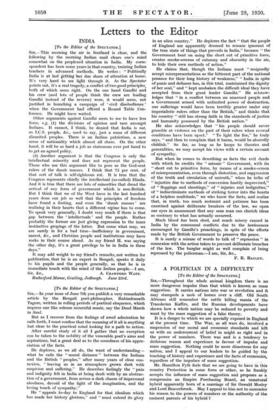[To the Editor of the SPECTATOR.] SIR,—In your issue of
June 7th you publish a very remarkable article by the Bengali poet-philosopher, Rabindranath Tagore, written in rolling periods of poetical eloquence, which
impress one like solemn mournful music, say the Dead March in Saul.
But as I recover from the feelings of awed admiration he calls forth, I must confess that the meaning of it all is anything but clear to the practical mind looking for a path to action.
After careful study of it all I gather that no exception can be taken to the nobility of the venerable poet's aims and aspirations, but a great deal as to the soundness of his appre- ciation of the facts.
He deplores, as we all do, the want of understanding— what he calls the "moral distance" between the Indians and the British "peoples," after many years of close con- nexion, "leaving us in an atmosphere grown dark with suspicion and suffering." He describes feelingly the "pain and indignity felt in India at _being dealt with by an abstrac- tion of a government, from across a dark chasm of-impersonal aloofness, devoid of the light of the imagination, and the loving touch of sympathy."
He "appeals to-day to England for that idealism which has made her history glorious," and "must extend its glory in an alien country." He deplores the fact "that the people of England are apparently doomed to remain ignorant of the true state of things that prevails in India," because "the Government bent on using the short cut of primitive force, creates smoke-screens of calumny and obscurity in the air, to hide their own methods of action."
He claims that, though the Indians must "resignedly accept misrepresentations as the bitterest part of the national penance for their long history of weakness," "India in spite of panic and defiance has, in this trial, maintained the dignity of her soul," and "kept unshaken the difficult ideal they have accepted from their great leader Gandhi." He acknow-
ledges that "in a. conflict between an unarmed people and a Government armed with unlimited power of destruction, our sufferings would have been terribly greater under any, imperialistic rulers other than the British," and thinks that his country "still has strong faith in the standards of justice and humanity possessed by the British nation."
He also acknowledges that "his people should never grumble at violence on the part of their rulers when normal' conditions have been upset." "To light the fire," he truly says, "and then to complain that it burns, would be absurdly childish." So far, as long as he keeps to theories and generalities, we may accept his views with a certain amount of sympathy.
But when he comes to describing as facts the evil deeds
with which he. credits the " satanic " Government, with its ".short cut to primitive force, by means of a smoke-screen of misrepresentation, even through distortion, and suppression of the truth and circulation of untruth," when he talks of "injustice due to methods of conversion hastily improvised," of "floggings and shootings," of "injuries and indignities," of " indiscriminate methods of striking terror into the hearts of a helpless multitude," we who know the facts, and realize that, in truth, too much restraint and patience has been exercised against deliberate breakers of the law, we open our eyes in amazement that any sane man can cherish ideas so contrary to what has actually occurred.
Much blood has been shed, and much misery caused in India by the communal conflicts due to the lawlessness encouraged by Gandhi's preachings, in spite of the efforts made by the British Goveriunent to preserve the peace.
It is surely a misuse of words to talk of " repression " in connexion with the action taken to prevent deliberate breaches of the law. The burglar might as well complain of being repressed by the policeman.—! am, Sir, &c.,
F. R. BAGLEY.


















































 Previous page
Previous page